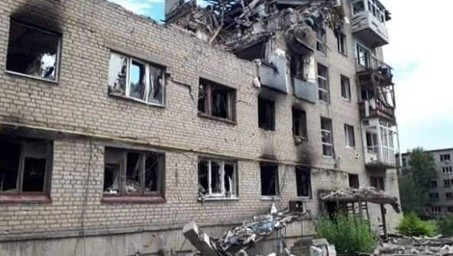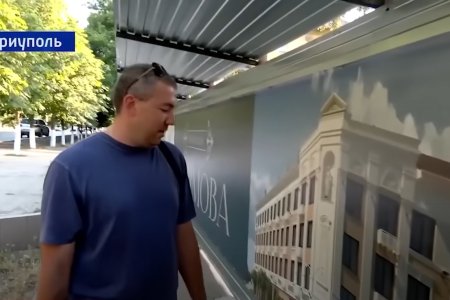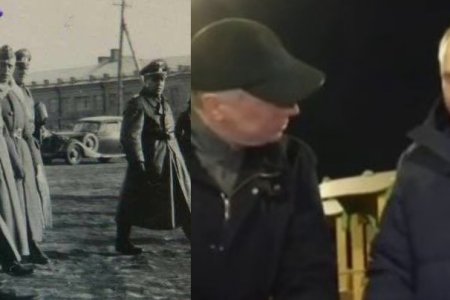
Even ‘Russian world’ fanatics are admitting that Russia has brought only devastation to occupied parts of Donetsk and Luhansk oblasts (occupied Donbas). While one has even spoken of the shame he felt, Russian talk shows on state-controlled television channels provide a daily platform for individuals like Duma deputy Alexei Zhuravlev who sees no problem with suggesting that some Donbas cities, should be simply razed to the ground. Rather like Popasna, in Luhansk oblast, which the Russian occupiers decided over a year ago was “not worth’ rebuilding.
Acknowledgement that Russia has brought only death and destruction to occupied Donbas was voiced, even by chief players, long before Russia’s full-scale invasion. During at least two interviews in 2020-2021, Igor Girkin, who helped Russia seize control first of Crimea, then of Donetsk oblast, admitted that occupied Donbas had turned into “a dump” and “black hole”.
Girkin is now in detention in Russia, facing a possible five-year sentence for his criticism, not of Russia’s war against Ukraine, but of how it is being waged. Neither he, nor his ‘Russian world’ comrades, could be suspected of pro-Ukrainian views, but those comrades are now also openly talking about the misery that Russia has brought to Donbas.
Sergei Aliev, a ‘Russian Orthodox’ blogger recently spoke to journalists outside the latest hearing extending Girkin’s detention. He had been in Sievierodonetsk (Luhansk oblast), he said, and had been approached by elderly ladies who demanded to know “You joined us [to the Russian Federation], you liberated us – from what, tell us? From food? From water? From electricity? So tell us, what did you liberate us from? And I was ashamed.”
In fact, Aliev appears to have understood certain aspects of Russia’s aggression considerably earlier. In October 2022, he gave an interview, in which he explained his warning that “Russians should prepare for the grave consequences that we saw in Donbas and in Ukraine [sic]…. You just have to look at the situation through Ukrainians’ eyes.” Russia is attacking their territory, why should Ukrainians not attack parts of Russia? “This is a ‘special military operation for us, while for them, it’s war! I’m therefore almost sure that if not today, then tomorrow, what is happening there now could happen on Russian territory. That is precisely an open invasion.”
Ukrainian journalist Denis Kazansky, who drew attention to Aliev’s words about Sievierodonetsk, has also posted a video with Pavel Gubarev who, like Girkin, played an active role in the events of 2014 and is now taking a very different line.
Unlike Girkin and Aliev, Gubarev was born in Ukraine, but has clearly been a ‘Russian world’ supporter since his initial involvement in the neo-Nazi, Russian chauvinist ‘Russian National Unity’ party. At the beginning of March 2014, he tried to lead a ‘people’s revolt’ in Donetsk, very much according to the plan exposed a little later in the Glazyev Tapes, and clearly funded and orchestrated from Moscow. The attempt failed, and Russia first sent in thugs from across the border, and then Girkin and other highly trained fighters who seized control of Sloviansk on 12 April 2014.
Gubarev acknowledged back in December 2020 that there had never been a ‘civil war’ in Donbas, as claimed by Moscow. Without Russian involvement, and specifically the Russian-funded and armed offensive by Girkin & Co., the events of 2014 would have remained “a usual, unarmed and toothless street protest.” Both Girkin and Gubarev have been blunt in admitting that there was no mass support for any such ‘uprising’.
It is not clear when exactly Gubarev was speaking in the video posted by Kazansky since he speaks of “eight years”, rather than the nine years that have elapsed since 2014. This, however, changes little of substance, with the words damning whenever spoken. While Gubarev’s main message is that “we were simply robbed for eight years”, and that the two so-called ‘people’s republics’ have turned into ‘banana republics’, he drops Moscow’s narrative on another key subject. He twice talks of the ”eight years of the special military operation”. This was Russian president Vladimir Putin’s euphemistic term for his full-scale invasion of Ukraine, announced early on 24 February 2022. Gubarev is, however, quite right in dating the beginning of this war of aggression to early 2014. He is also doubtless correct in saying that officials in Russia (who, in his words, should have viewed occupied Donbas “as a geopolitical project”, saw it merely as a resource to be plundered.
This is the real reason why Russia has made little attempt to rebuild most of the areas that it seized control of after merciless bombing and shelling. While there is fairly extensive building going on in the centre of Mariupol, the new buildings are being illegally ‘sold’, generally to Russians since local residents cannot afford to take out a mortgage to ‘buy’ an apartment built on the territory of those that Russia destroyed.
The humanitarian crisis that Russia had brought to newly seized Ukrainian territory was even noted by Russian world supporters back in August 2022. Over a year later, little appears to have been done to improve the situation in Sievierodonetsk and other occupied parts of Luhansk oblast.
On 16 September, Roman Vlasenko, head of the Sievierodonetsk District Administration, reported that the occupation regime had not prepared the city for winter, with residents forced to endure a second winter without heating. A day earlier, the Luhansk Regional Military Administration, had reported that special equipment had been brought in from Russia for demolishing buildings. With the fake elections behind them, the Administration wrote, the Russians have dropped any pretence of planning swift restoration. Now they are concentrating on demolishing buildings, with this, like in Mariupol, a way of concealing the evidence of Russia’s crimes.
In Lysychansk, which was also taken by the Russians only after the latter subjected it to constant bombing, a supposed ‘contemporary multifunctional centre’ was opened in July. The Administration points out, however, that the centre is effectively refusing to provide services to pensioners, with any pretext conjured up for refusing to see more than a few pensioners in a day. They are only booking appointments for November, with the Administration noting that this is still better than in occupied Rubizhne where the analogous queue is for appointments in almost a year.
Very many pensioners may not survive till then.
See also: Mariupol residents whose apartments Russia bombed left homeless as new buildings sold to Russians



